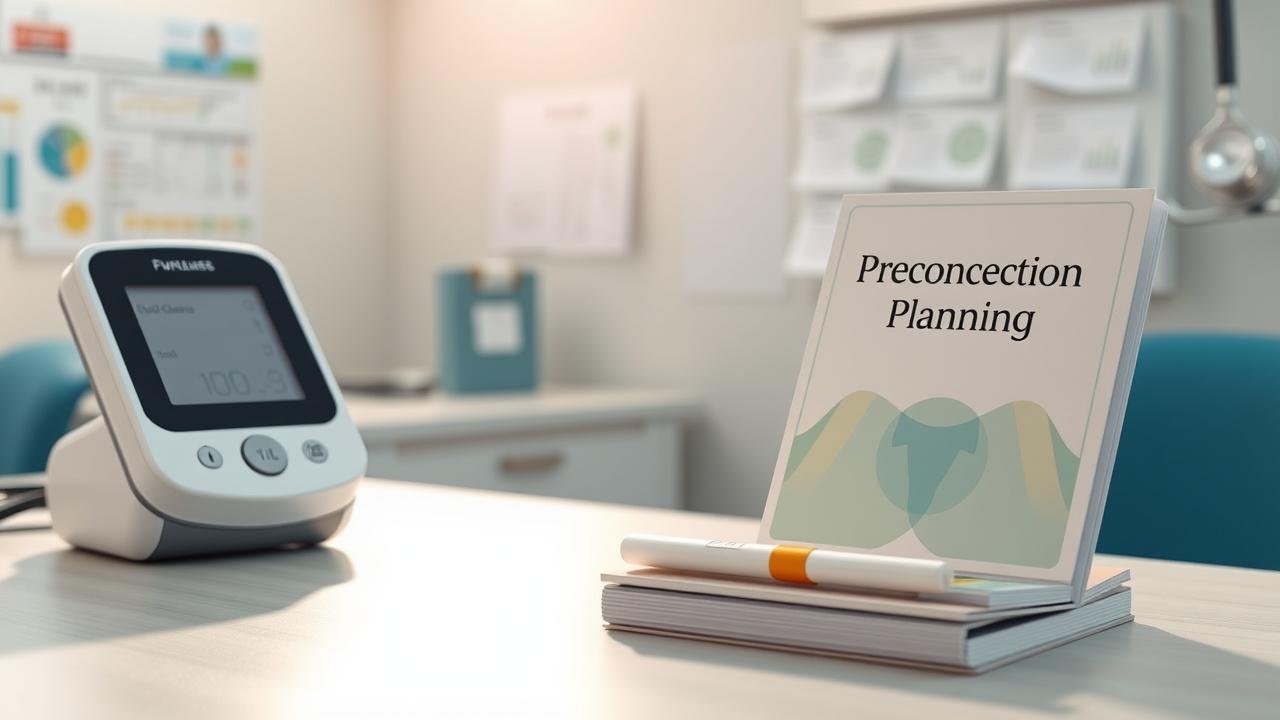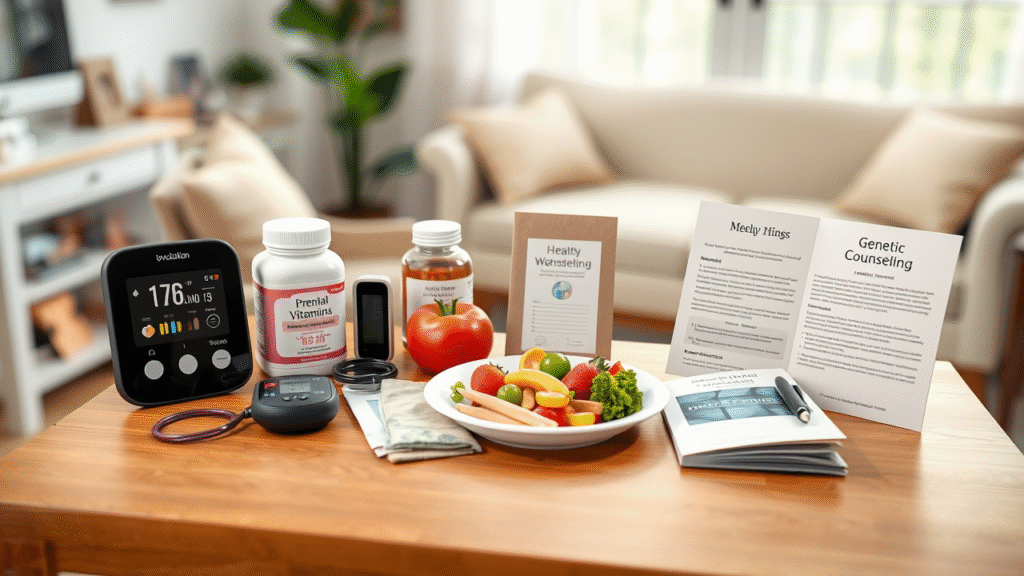Preconception care plays a crucial role in fertility planning by preparing your body and mind for a healthy pregnancy journey. This comprehensive approach goes beyond just timing conception—it involves understanding key health assessments, making lifestyle adjustments, and addressing chronic conditions that impact fertility. From mental well-being to environmental factors and genetic counseling, preconception care covers diverse areas that work together to boost your chances of success. Exploring these interconnected elements reveals why early preparation matters so much for both conception and long-term pregnancy health.
Understanding the Basics of Preconception Care and Its Role in Fertility Success
Understanding the basics of preconception care is essential for anyone planning to conceive, as it lays the foundation for fertility success by addressing health factors before pregnancy begins. This proactive approach involves a comprehensive evaluation of physical, nutritional, and emotional well-being to identify any obstacles that could affect conception or pregnancy outcomes. By grasping these fundamentals, individuals can better appreciate how key components and health assessments provide targeted insights into their reproductive health. It also highlights why lifestyle changes and nutritional strategies play a pivotal role in optimizing fertility before conception. Furthermore, this foundational knowledge connects seamlessly with understanding the impact of chronic health conditions and environmental factors on fertility, emphasizing the importance of a holistic perspective. Recognizing mental and emotional well-being’s influence ensures effective preconception care goes beyond physical readiness. Ultimately, mastering these basics helps frame the significance of genetic counseling and long-term benefits when planning for a healthy pregnancy.
Key Components and Health Assessments Involved in Preconception Care

Key components and health assessments form the foundation of effective preconception care, ensuring individuals are physically prepared for pregnancy and optimizing fertility outcomes. This process typically includes a comprehensive medical history review, screenings for infectious diseases, immunizations updates, and evaluations of chronic conditions—linking closely to the blog’s focus on how chronic health issues impact fertility. Nutritional status checks and lifestyle evaluations also play a crucial role, connecting with strategies highlighted in the lifestyle and nutrition section. Mental health screenings are increasingly recognized as vital, underscoring the importance of emotional well-being discussed elsewhere in the blog. Environmental exposures and occupational hazards are assessed to minimize risks to reproductive health, tying into environmental factors covered in other parts of the series. Finally, genetic counseling is integrated to identify hereditary risks, supporting informed decision-making as explored in related sections. Together, these assessments create a tailored care plan that promotes a healthy pregnancy journey from conception planning through long-term outcomes.
Lifestyle Changes and Nutritional Strategies to Optimize Fertility Before Conception
Lifestyle changes and nutritional strategies play a pivotal role in optimizing fertility before conception, serving as foundational steps within comprehensive preconception care. Adopting a balanced diet rich in essential vitamins, minerals, and antioxidants supports reproductive health by regulating hormonal balance and improving egg and sperm quality. Coupled with regular physical activity, these adjustments can enhance metabolic function and reduce risks associated with chronic conditions that impact fertility, linking closely to the section on managing chronic health issues. Equally important is minimizing exposure to environmental toxins and occupational hazards that may interfere with reproductive processes, echoing concerns discussed in environmental factors affecting fertility. Addressing mental and emotional well-being through stress reduction techniques further complements these lifestyle shifts, promoting hormonal stability critical for conception success. Together, these strategies form a proactive approach within preconception care that not only prepares the body for pregnancy but also aligns with genetic counseling efforts to ensure healthier outcomes for both parents and future children.
The Impact of Chronic Health Conditions on Fertility and Preconception Planning

Chronic health conditions can significantly influence fertility and underscore the importance of thorough preconception planning. Conditions such as diabetes, thyroid disorders, or autoimmune diseases often affect hormonal balance and reproductive function, making early identification through key health assessments essential. Managing these illnesses before conception improves fertility outcomes and reduces pregnancy complications, linking closely to lifestyle changes and nutritional strategies that support overall reproductive health. Addressing chronic conditions also involves emotional well-being considerations since ongoing health challenges can increase stress, emphasizing the interconnectedness highlighted in mental health-focused preconception care. Moreover, chronic illnesses may necessitate specialized genetic counseling to evaluate risks for inherited conditions, reinforcing the need for comprehensive risk assessment. Understanding how these factors interplay demonstrates why preconception care is not just about immediate fertility but sets the foundation for a healthy pregnancy journey, resonating with long-term benefits emphasized throughout effective fertility planning.
The Role of Mental and Emotional Well-Being in Effective Preconception Care
Mental and emotional well-being plays a critical role in effective preconception care, influencing fertility planning beyond just physical health. Stress, anxiety, and unresolved emotional challenges can disrupt hormonal balance, menstrual cycles, and sperm quality, making it essential to address these factors alongside the medical assessments detailed in key components of preconception care. Cultivating mental resilience supports healthier lifestyle changes and nutritional strategies by fostering motivation and consistency. Moreover, managing emotional health is vital when navigating chronic conditions or environmental stressors that may impact fertility. Integrating mental wellness into genetic counseling sessions can also help couples cope with potential risks and make informed decisions with greater confidence. Ultimately, prioritizing emotional stability lays a strong foundation for pregnancy preparation, complementing the comprehensive approach outlined in understanding the basics of preconception care and contributing significantly to long-term maternal and fetal well-being during pregnancy planning.
Environmental and Occupational Factors Affecting Fertility in Preconception Care

Environmental and occupational factors play a critical role in fertility outcomes, making their consideration essential within preconception care. Exposure to toxins such as pesticides, heavy metals, and endocrine disruptors can impair reproductive health by affecting hormone balance and gamete quality. Workplace hazards like radiation, extreme heat, or prolonged chemical contact also contribute to reduced fertility potential. Addressing these risks aligns closely with the broader objectives outlined in lifestyle changes and nutritional strategies to optimize fertility before conception. Identifying and mitigating environmental exposures complements health assessments that evaluate chronic conditions impacting fertility, ensuring a comprehensive approach. Moreover, recognizing how stress from hazardous environments influences mental and emotional well-being further underscores the interconnected nature of preconception care components. By incorporating environmental risk evaluation into genetic counseling and risk assessment processes, couples gain a clearer understanding of factors influencing their reproductive success. Ultimately, this holistic attention to surroundings supports planning for a healthy pregnancy by minimizing preventable fertility barriers early on.
How Preconception Care Supports Genetic Counseling and Risk Assessment
Preconception care plays a crucial role in genetic counseling and risk assessment by identifying inherited conditions and potential health risks before pregnancy. Through comprehensive evaluations—outlined in the key components of preconception care—health providers can screen for family history, carrier status, and genetic disorders that may affect fertility or fetal development. This proactive approach allows couples to make informed decisions about conception timing and interventions, reducing the chance of passing on hereditary diseases. Integrating lifestyle changes and managing chronic health conditions further supports minimizing genetic risks, while addressing mental well-being ensures emotional readiness for navigating complex information. Moreover, understanding environmental exposures complements this genetic focus by highlighting external factors that might influence reproductive outcomes. Ultimately, this synergy between preconception care and genetic counseling not only enhances fertility success but also lays the foundation for planning a healthy pregnancy with optimized chances for long-term maternal and child health.
Planning for a Healthy Pregnancy: The Long-Term Benefits of Preconception Care
Embracing preconception care lays a strong foundation not only for conception but for a healthier pregnancy and beyond. By addressing physical health, emotional well-being, and environmental influences early on, prospective parents can create lasting benefits that extend into parenthood. This thoughtful preparation reflects the interconnected nature of fertility planning explored throughout this blog—from lifestyle shifts to genetic insights—highlighting how every detail matters. At MomDadDispatch.com, we understand that this journey is deeply personal, offering guidance with empathy as you nurture your path toward growing a family.






